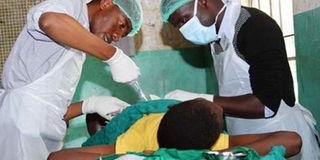Govt targets 900 men for voluntary circumcision in Mombasa

A man being circumcised in a hospital. According to the World Health Organisation, circumcision prevents infection and transmission of sexually transmitted diseases by about 60 per cent. FILE PHOTO | NATION MEDIA GROUP
What you need to know:
- According to the NASCOP programme manager Jacob Odhiambo, since its launch in 2008, they have managed to reduce spread of about 33,000 HIV infections among men and circumcised at least 1.2 million people in 10 counties including Mombasa.
- The health workers were supported by community leaders in calling on the national government and county governments to install modern equipment in health facilities and hire professional health practitioners with experience in circumcision.
Over 900 boys and men in Mombasa County are being targeted for circumcision in a new drive by the government to reduce new HIV infections caused through the exercise.
The National Aids and STI Control Programme (NASCOP) said on Friday that it is targeting men aged between 10 and 50 years to undergo the cut under Voluntary Medical Male Circumcision (VMMC).
According to the NASCOP programme manager Jacob Odhiambo, since its launch in 2008, they have managed to reduce spread of about 33,000 HIV infections among men and circumcised at least 1.2 million people in 10 counties including Mombasa.
Dr Odhiambo, however, said that NASCOP is yet to reach all men in some counties like Mombasa for modern circumcision as many still opt for the traditional way of circumcision besides culture, stereotypes and myths associated with the medical exercise.
“There are some communities in Mombasa whose traditions do not allow them to circumcise and this has been a challenge,” said Dr Odhiambo.
He noted that 1,199 adults and 253 children died from HIV related illnesses in Mombasa in the year 2015, figures that they want to reduce.
He added: “Mombasa had 2,426 adult new HIV infections and 319 new infections among children below 14 years last year.”
He was speaking during a health stakeholder’s forum aimed at highlighting challenges affecting implementation of the voluntary circumcision programme in Mombasa as well as finding their solutions. The forum was held at Pathfinder offices in Nyali.
“Research has shown that once a man is circumcised, their chances of getting infected with HIV is reduced by up to 60 per cent and therefore it is a beneficial exercise,” he added.
INCREASE AWARENESS
Participants urged the national government and county governments to increase awareness about the programme through community radio stations, flyers, posters among other media.
“Empower village elders on the benefits of VMMC and encourage them to spread the word to community members in their midst,” said a participant.
They also recommended use of school debates so as to encourage teenagers who fear the exercise embrace the modern way.
The health workers were supported by community leaders in calling on the national government and county governments to install modern equipment in health facilities and hire professional health practitioners with experience in circumcision.
They raised concern that many young men were being exposed to the virus by failing to explore the medical option due to culture while some lack funds to afford the procedure.
According to World Health Organization (WHO) medical male circumcision reduces the risk of female to male sexual transmission of HIV by approximately 60 per cent.
“People at the grassroots are going to traditional circumcisers because equipped hospitals are far away and they do not have money for bus fare and to pay for the bills,” said Donald Sirya, a community health committee (CHC) member from Kisauni.
QUACKS
Mr Sirya added that the few specialists who may be available to do the procedure are often busy treating malaria and other common illnesses to attend to people seeking circumcision services and are often exhausted to perform the procedure well.
Justina Suna, from Tudor said medical experts will also expose unqualified and unskilled people offering the services to unsuspecting members of the public.
“There was a time people who called themselves specialists from foreign countries came in and offered free services and many children were ‘circumcised’.
“Later on it was discovered that those who performed the procedure on them did not even remove the foreskin, had caused unnecessary injuries to children some of whom had to undergo expensive corrective surgery to rectify the procedures,” said Ms Suna.
Floringi village elder Shaheed Abdalla appealed to government to waive the costs of dressing wounds to encourage others who have not undergone the cut to do so.
Other participants said that fear of stigmatisation among adults who go for the cut and the ‘pain’ has kept away men.
“Some people who are not getting circumcised say that their traditions do not allow them and as such they do not see the need for it,” said Dr Odhiambo.
He added that it has been challenging to circumcise communities who believe that ‘pain’ is an important aspect to experience during circumcision, a factor which makes people to fear despite the hospital procedure being painless.
Dr Odhiambo added that some men feared losing jobs or being rendered less productive at their work places owing to the period needed for the wound to heal.
The health stakeholder’s forum which was held at Pathfinder officers in Nyali, aimed at highlighting the challenges affecting the implementation of the voluntary circumcision in Mombasa county and finding solutions to those challenges.





